U.S. Foreign Policy, a Cincinnati and Northern Kentucky Issue
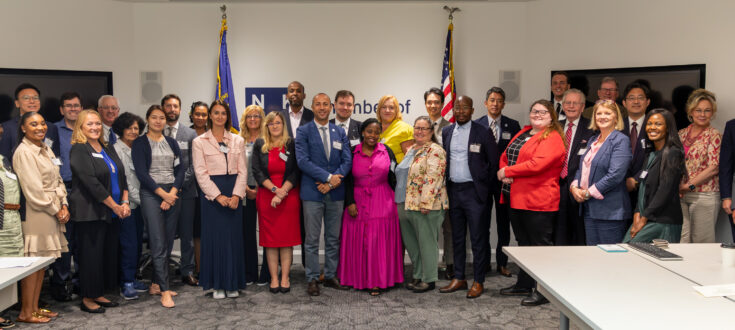
Does U.S. Foreign Policy affect the every day Cincinnatian or local Northern Kentuckian?
I don’t think that’s a question that often crosses our minds. Foreign Policy sometimes feels like one of those issues that sounds really important, but it still goes over our head. (Don’t worry, you aren’t the only one.)
September 2nd-6th, the World Affairs Council welcomed a delegation from a multitude of countries, including Argentina, Djibouti, Estonia, Fiji, Finland, France, Japan, Kyrgyz Republic, Lebanon, the Republic of Korea, the Republic of Turkiye, South Africa, Taiwan, and Tunisia. They had come to Cincinnati and Northern Kentucky to learn about foreign policy from a local U.S. perspective, immigration in the Midwest, and tariffs in the Midwest.
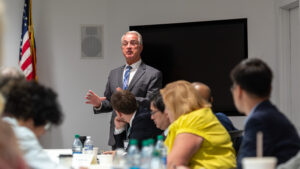
Judge Gary Moore, from Boone County Fiscal Court speaking to the delegates.
On September 5th, we partnered with the Northern Kentucky Chamber of Commerce to host a Foreign Policy Reception. It was incredible to see the turnout. Representatives from the World Affairs Council Board Members, Northern Kentucky Chamber of Commerce, Clovernook, Verst Logistics, the European-American Chamber of Commerce, Expeditors International, Frost Todd Brown, Thomas Moore University, Kentucky Refugee Ministries, Camco Chemical, Albert Couture, Northern Kentucky University, ATech Training, Inc., Dinsmore and Shohl, LLP, World Trade Center Kentucky, Miami University, and Home Helpers all showed up to participate in the roundtable conversation. Judge Gary Moore, from the Boone County Fiscal Court, facilitated the conversation and lent his experience as he led the conversation.
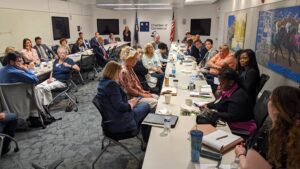
During this meeting, there were many things that were discussed, but one of the most interesting was the focus on bringing in international expertise to the Northern Kentucky region. There are 63 languages spoken in Boone County alone. This is because Northern Kentucky offers a great quality of life for incoming immigrants and refugees.
Due to the influx of Ukrainian refugees, Sen. Chris McDaniel, a Taylor Mill Republican who is chair of the state Senate Appropriations and Revenue Committee, created a state fund to provide grants of up to $10,000 for up to 5,000 families who have been displaced by international conflict. As part of this fund, a new scholarship pilot program was designed to support undergraduate students displaced by crises in their home countries through the Kentucky Council on Postsecondary Education and the Kentucky Higher Education Assistance Authority. The scholarships are funded by a $10 million appropriation by the General Assembly.
Northern Kentucky University and Thomas More University are two Northern Kentucky universities who have students who have received this award. Kentucky is the ONLY state to have this program.
But why is that important?
No one could say it better than Kentucky Governor, Andy Beshear (in a 2022 interview),
“This scholarship program will give displaced students the chance to earn a degree at one of our outstanding colleges and universities and go on to use those skills to contribute to our state’s economy,” said Kentucky Senate President Robert Stivers. “Kentucky students will also have the opportunity to study internationally. Helping students gain those learning experiences will help strengthen our workforce.”
Investing in students invests in our region. The U.S. has a declining population and Northern Kentucky is no different. In 15-20 years we will not be able to support its workforce. Therefore, we must train student in our region’s most important exports, such as aerospace, pharmaceuticals, chemicals, biosciences, agricultural manufacturing, produce, and defense manufacturing. Other paramount operations which are beginning to open in Northern Kentucky that will become increasingly important exports are electric car batteries. These investments into our region are especially important because 2/3rds of the U.S. population can reach the Northern Kentucky/ Greater Cincinnati region with 2-4 hours which means that we are in a prime location for international trade.
Northern Kentucky already has seen foreign companies looking to bring their business here. There are more than 400 foreign-owned businesses in Northern Kentucky, most of which are in Boone County.
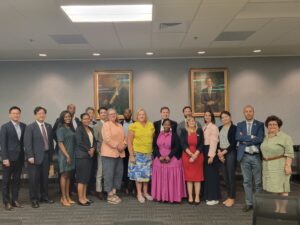
Delegation with Alexandra Lubans-Otto, Esq.
After this phenomenal meeting, the delegation went to meet with the Immigrant and Refugee Law Center. During this meeting, the conversation was geared towards the current attitudes of immigration and refugees.
Alexandria Lubans-Otto, Esq. spoke to the delegates about her work as an attorney for these refugees. She is the only law provider of immigration that provides her services pro-bono.
One of the biggest hurdles is that the current immigration law is from 1800. It has been relatively unchanged since 1997. This seems quite shocking because U.S. policy and attitudes towards these issues have.
She said that many of the families are afraid of ICE raids, especially the children. Many are afraid that if they go to school, their families will be deported. Unfortunately, this has happened more than once. Their fear is not unfounded.
Immigrants in the U.S. are nine to ten times more likely to be the victim of a crime if you are not a citizen. Scare tactics and racists tropes often make their way into immigration law policies. Lubans-Otto explained that often other marginalized communities are not sympathetic because they already face so many issues.
The best way to overcome these issues is create new types of visas. Economic and Commerce visas could easily be accepted by both sides of the aisle. These types of visas would acknowledge the skills of refugees. As we said before, their expertise in commerce and the economy would bolster the American workforce. These new types of visas would also open and overturn zombie cases– or cases which have not been seen.
Lubans-Otto left us with this thought: We have to invest in countries to put their people first so they aren’t forced to leave.
We ended our day by meeting with Cincinnati Vice Mayor, Jan-Michele Kearney, City Manager, Sheryl M. M. Long, and Deanna White, Human Resources Department.
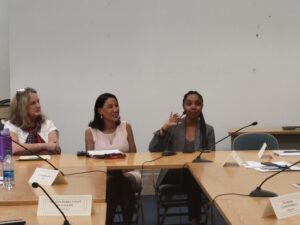
Deanna White (left), Jan-Michele Kearny (middle), Sheryl M. M. Long (right)
During the meeting, one delegates asked, how do states affect foreign policy making?
This is a good question!
According to the Vice Mayor and City Manager, Cincinnati City Council is often frustrated with state legislators and the restrictions they put on them. There are many time the City of Cincinnati is in opposition of the state legislation. However, things here in the city often get done more quickly because the City Council is all on the same page.
It was important to explain that currently, one of the most important issues that Cincinnati faces is an affordable house crisis. This is due to migration in-land due to climate crises. During the 2015 recession, properties that had been under-funded were unable to be renovated. Landlords bought these properties up, renovated them, and raised prices. Now, the biggest problem are investors buying them up. Fortunately, the Cincinnati City Manager has the power to sue these investors. She is currently in the process to reach out to suburbs to share her resources and information to ensure that investors cannot buy up properties there and do the same thing.
However, there are public programs and non-profits, such as STEP UP, for those who find themselves homeless. STEP UP renovates hotels and motels to turn them into affordable housing. They also provide mental health services and job transition to help those who are homeless to ensure that they can get the help they need to get back into the job market and have a place to come home to.
The Vice Mayor and City Manager agreed that on all issues, community engagement is key. Their input at Budget and Finance Committee Meetings, where community members can go and spend two minutes talking to the City Council and the Mayor, helps locate where the resources go. It is important to know what the community’s priority’s are.
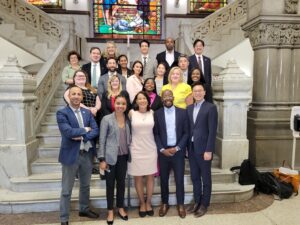
Delegates with Vice Mayor, Jan-Michele Kearney (center right), and City Manager, Sheryl M. M. Long (center left).
So does foreign policy affect the every day Cincinnatian and Northern Kentuckian? I would say that the answer to that question is yes.
While we might not always recognize how foreign policy affects us, it is there. We are the ones who create foreign policy. Our actions as a region can shape the policies that our senators propose and vote on.


